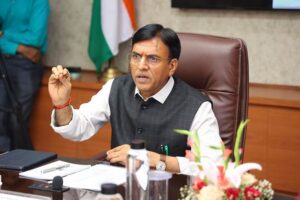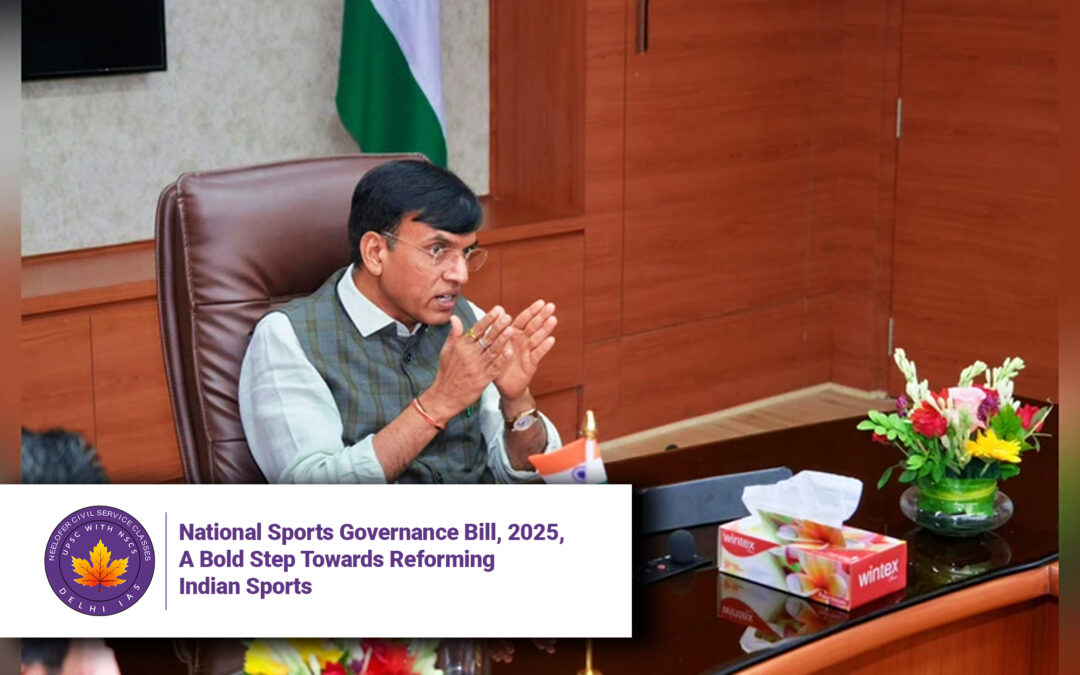National Sports Governance Bill, 2025, A Bold Step Towards Reforming Indian Sports
Why in News?
On July 1, 2025, during a high-level meeting at the International Olympic Committee (IOC) headquarters in Lausanne, Switzerland, India’s sports governance system came under scrutiny. The IOC expressed deep concern over corruption, doping scandals, and mismanagement in Indian sports bodies. In response, the Indian Government has introduced a landmark reform—The National Sports Governance Bill, 2025, aimed at overhauling India’s sports ecosystem. 
Introduction
For decades, India’s sports federations have suffered from non-transparent elections, corruption, nepotism, and inefficiency. The new bill aims to restructure sports governance with an emphasis on transparency, fairness, athlete welfare, and global alignment.
The bill proposes three key institutional mechanisms:
-
National Sports Board (NSB)
-
National Sports Election Panel (NSEP)
-
National Sports Tribunal (NST)
These institutions will work together to reform policy, ensure justice, and guarantee fair elections in sports bodies.
Key Provisions of the Bill
1. Structural Reforms
-
NSB will act as a central policymaking and monitoring body.
-
It will promote athlete welfare, oversee federations, and ensure ethical conduct.
-
It will also coordinate infrastructure funding and policy direction.
2. Electoral Transparency
-
The NSEP will independently supervise elections in sports federations.
-
It will set clear guidelines to eliminate external interference and unopposed elections.
-
This aims to instill democratic values and trust in federations.
3. Fast Justice through NST
-
The NST will address sports-related disputes with speed and fairness.
-
It will offer an independent and accessible dispute resolution process.
-
Appeals may directly reach the Supreme Court only after exhausting NST remedies.
Focus on Athlete Welfare and Clean Sport
India has been struggling with doping scandals and match-fixing, ranking second globally in doping violations. The bill proposes:
-
Biometric and forensic tools for athlete verification.
-
Centralized databases to prevent manipulation.
-
Collaboration with NADA and WADA for education, testing, and enforcement.
The aim is to make India a global example of fair and clean sports.
Fair Play and Global Standards
Inspired by Olympic and Paralympic Charters, the bill reinforces:
-
Transparency
-
Non-interference from politics
-
Fixed tenures for administrators
-
Strict penalties for corruption and fraud
These reforms are designed to prioritize athletes over officials, and public interest over personal gain.
Conclusion
The National Sports Governance Bill, 2025, if implemented successfully, could mark a new era for Indian sports—placing athletes at the center, ensuring justice, and promoting transparency. It’s a step toward making India a global sports leader, both in talent and ethical governance.
Q&A Section
Q1. What is the main objective of the National Sports Governance Bill, 2025?
A1. The bill aims to ensure transparency, athlete welfare, fair elections, and ethical governance in Indian sports bodies through structural and legal reforms.
Q2. What are the three key institutions proposed under the bill?
A2. The National Sports Board (NSB), National Sports Election Panel (NSEP), and National Sports Tribunal (NST).
Q3. How does the bill address doping and match-fixing?
A3. By introducing biometric verification, centralized databases, and close collaboration with NADA and WADA to enforce anti-doping laws strictly.
Q4. Why did the International Olympic Committee raise concerns about Indian sports?
A4. Due to persistent mismanagement, corruption, unopposed elections, and India’s high doping rates.
Q5. How will the NST improve the justice system for athletes?
A5. The NST will offer quick and fair resolutions to disputes, reducing delays and allowing appeals to go to the Supreme Court only after NST remedies are exhausted.








